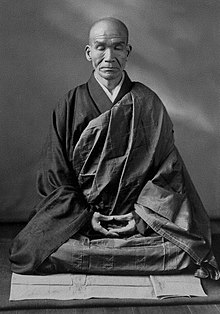You are currently logged-out. You can log-in or create an account to see more talks, save favorites, and more. more info
Zazen Talks

Zazen is a meditative discipline that is typically the primary practice of the Zen Buddhist tradition.
The generalized Japanese term for meditation is 瞑想 (meisō); however, zazen has been used informally to include all forms of seated Buddhist meditation. The term zuòchán can be found in early Chinese Buddhist sources, such as the Dhyāna sutras. For example, the famous translator Kumārajīva (344–413) translated a work termed Zuòchán sān mēi jīng (A Manual on the Samādhi of Sitting Meditation) and the Chinese Tiantai master Zhiyi (538–597 CE) wrote some very influential works on sitting meditation.
The meaning and method of zazen varies from school to school, but in general it is a quiet type of Buddhist meditation done in a sitting posture like the lotus position. The practice can be done with various methods, such as following the breath (anapanasati), mentally repeating a phrase (which could be a koan, a mantra, a huatou or nianfo) and a kind of open monitoring in which one is aware of whatever comes to our attention (sometimes called shikantaza or silent illumination). Repeating a huatou, a short meditation phrase, is a common method in Chinese Chan and Korean Seon. Meanwhile, nianfo, the practice of silently reciting the Buddha Amitabha's name, is common in the traditions influenced by Pure Land practice, and was also taught by Chan masters like Zongmi.
In the Japanese Buddhist Rinzai school, zazen is usually combined with the study of koans. The Japanese Sōtō school makes less or no use of koans, preferring an approach known as shikantaza where the mind has no object at all.
| Title | Speaker | |
|---|---|---|
Oxherding Journey: From Crisis to Enlightenment Samsara, Resistance, Zazen |
Oct 24 2016 |
|
Since You Cannot Waste Time, Don’tWisdom, Karmic Consequences, Consciousness, Rumi, Karmic Consequences, cognitive... |
Oct 08 2016 AM No Abode Hermitage |
|
Pivotal Presence: Embracing Zazen Mind Karmic Consciousness, Zazen, Chanting |
Aug 27 2016 |
|
Zazen: Subtle Knots of Knowing Consciousness, Zazen, Book of Serenity |
Aug 26 2016 |
|
Listening to Dharma's Compassionate Cries Meditation, Zazen |
Aug 25 2016 |
|
Embrace Stillness, Sustain Consciousness Stillness, Zazen, Buddha Mind |
Aug 24 2016 |
|
The Unceasing Effort to Free All BeingsCompassion, Separation, Zazen, Nirvana |
Aug 06 2016 AM No Abode Hermitage |
|
Liberation Through Non-Abiding Compassion Consciousness, Separation, Zazen |
Aug 06 2016 AM |
|
Being Time in Turbulent timesSerial: TL-00428 ADZG Sunday Morning, Time, Dogen, Zazen |
Jul 17 2016 Ancient Dragon Zen Gate |
|
I Don't Know WhatSerial: TL-00426 ADZG Sunday Morning, Samadhi, Practice, Zazen |
Jun 26 2016 Ancient Dragon Zen Gate |
|
The Pivotal Business of Buddha’s HouseLotus Sutra, Lotus Sutra, Faith, Zazen, Perfect Wisdom, Bell, Samadhi |
Jun 11 2016 AM No Abode Hermitage |
|
Returning to the Buddha's Home Lotus Sutra, Zazen, Faith |
Jun 11 2016 AM |
|
A Lotus Sutra Narrative of the Bodhisattva PathLotus Sutra, Vow, Gaining Mind, Faith, Dharma Transmission, Zazen, Causation,... |
May 07 2016 AM No Abode Hermitage |
|
Following through with the Dung ShovelingCompassion, Faith, Intimacy, Japan, Priest, Suzuki Roshi, Zazen |
May 07 2016 PM No Abode Hermitage |
|
Embracing Suchness in Zen Practice Samadhi, Zazen, Letting Go |
Jan 21 2016 |
|
Cultivating Non-Thinking: Beyond Gain Samadhi, Consciousness, Zazen |
Jan 13 2016 |
|
Mindful Peace through Zazen Practice Buddha Mind, Zazen, Precious Mirror |
Nov 15 2015 |
|
Inconceivable Joy of Zen Practice Stillness, Zazen, Faith |
Oct 18 2015 |
|
Infinite Reflection: Surfing the Samadhi Stillness, Transmission, Zazen |
Oct 10 2015 AM |
|
Liberation Through Non-Thinking Zen Intimacy, Zazen |
Jan 26 2015 |